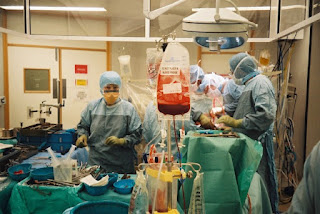 I’m in the middle of preparations for a big teaching day.
The topic is peri-operative blood management and a room full of medical
professionals will be the audience. Even with a quarter century of clinical
experience, lecturing for eight hours is nothing I should attempt on the fly.
Hence, hours have been logged with my nose back in the books and my
fingertips doing gymnastics across my PowerPoint slides.
I’m in the middle of preparations for a big teaching day.
The topic is peri-operative blood management and a room full of medical
professionals will be the audience. Even with a quarter century of clinical
experience, lecturing for eight hours is nothing I should attempt on the fly.
Hence, hours have been logged with my nose back in the books and my
fingertips doing gymnastics across my PowerPoint slides.
The texts, charts, figures, diagrams and pictures all remind
me of days gone by. Phone calls in the night, harried drives to the hospital,
changing into scrubs quicker than Superman can burst out of his phone booth. I
remember the adrenaline rush of assessing the situation and responding without
missing a beat. I can still feel my own quickened pulse as I ripped into
sterile packaging, tossing it over my shoulder and out of the way as I readied
the complex life-saving equipment. I strained to catch the report given as one
service passed off the patient to those of us in the operating suite. And yet,
as helter skelter as it may have seemed at times, each person in the room
worked in concert, brilliantly orchestrating the saving of another life—or at
least giving the patient another chance at a bettered quality of life.
I no longer live those medical dramas much more worthy than
a scene from Grey’s Anatomy. Gone is
the beeper, the on-call weekends, the routine and the emergent case. There is no
grateful surgeon. There is no feeling of camaraderie, each medical professional
contributing his piece of expertise. No patient’s family comes forward to thank
me for my service. I carry a longing for those things once more. It’s a
beautiful thing to help save or improve a life. Little can top that.
But, wait. Perhaps I have just traded the surgical arena for
another. My sporting arena includes a team who comes together every day to
rehearse their skills. Most days are routine. You need routine to prepare you
for the challenges. Some days take more effort. Team members have
to pick up a flailing athlete, make up for his weakness with their strengths,
and nurse him back to health. It can be difficult. But come race day, they are
ready to perform in perfect harmony.
 I’d like to think my role as a coach has something to do
with the strength and efficiency of the team. Now I get to play the role of surgeon;
the captain of the ship, the one who oversees, the one who decides what, when,
and where. It is my responsibility (and privilege) to assure the team trains
well and functions better. It’s my job to see that each person contributes his
special qualities to the whole. And when trouble comes, it’s my duty to lead
us, the team, to a successful solution.
I’d like to think my role as a coach has something to do
with the strength and efficiency of the team. Now I get to play the role of surgeon;
the captain of the ship, the one who oversees, the one who decides what, when,
and where. It is my responsibility (and privilege) to assure the team trains
well and functions better. It’s my job to see that each person contributes his
special qualities to the whole. And when trouble comes, it’s my duty to lead
us, the team, to a successful solution.
Bouncing along on a lengthy bus ride with my team, it
occurred to me that I’m still involved with saving lives—or at least helping to
make them better. Stronger athletes, faster runners, yes. But my work helps develop
mature individuals, young people who are focused and channel dedication and
devotion. And when you see a kid embrace his God-given talents and shine like
Cirrius in the night sky, well, little can top that.




No comments:
Post a Comment